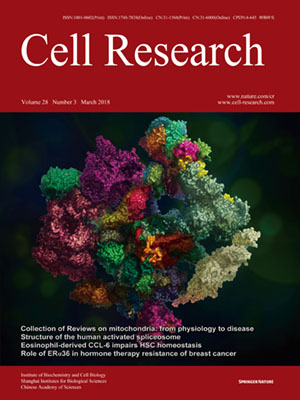
Volume 28, No 3, Mar 2018
ISSN: 1001-0602
EISSN: 1748-7838 2018
impact factor 17.848*
(Clarivate Analytics, 2019)
Volume 28 Issue 3, March 2018: 265-280
REVIEWS
Mitochondrial metabolism and cancer
Paolo Ettore Porporato1, *, Nicoletta Filigheddu2, *, Jose Manuel Bravo-San Pedro3, 4, 5, 6, 7, Guido Kroemer3, 4, 5, 6, 7, 8, 9, Lorenzo Galluzzi3, 10, 11
1 Department of Molecular Biotechnology and Health Sciences, Molecular Biotechnology Center, 10124 Torino, Italy;
2 Department of Translational Medicine, University of Piemonte Orientale, 28100 Novara, Italy;
3 Universite Paris Descartes/Paris V, Sorbonne Paris Cite, 75006 Paris, France;
4 Universite Pierre et Marie Curie/Paris VI, 75006 Paris, France;
5 Equipe 11 labellisee par la Ligue contre le Cancer, Centre de Recherche des Cordeliers, 75006 Paris, France;
6 INSERM, U1138, 75006 Paris, France;
7 Metabolomics and Cell Biology Platforms, Gustave Roussy Comprehensive Cancer Institute, 94805 Villejuif, France;
8 Pole de Biologie, Hopital Europeen George Pompidou, AP-HP, 75015 Paris, France;
9 Department of Women and Children Health, Karolinska University Hospital, 17176 Stockholm, Sweden;
10Department of Radiation Oncology, Weill Cornell Medical College, New York, NY 10065, USA;
11Sandra and Edward Meyer Cancer Center, New York, NY 10065, USA
Correspondence: Guido Kroemer,E-mail: kroemer@orange.fr;Lorenzo Galluzzi,(deadoc@vodafone.it)
Glycolysis has long been considered as the major metabolic process for energy production and anabolic growth in cancer cells. Although such a view has been instrumental for the development of powerful imaging tools that are still used in the clinics, it is now clear that mitochondria play a key role in oncogenesis. Besides exerting central bioenergetic functions, mitochondria provide indeed building blocks for tumor anabolism, control redox and calcium homeostasis, participate in transcriptional regulation, and govern cell death. Thus, mitochondria constitute promising targets for the development of novel anticancer agents. However, tumors arise, progress, and respond to therapy in the context of an intimate crosstalk with the host immune system, and many immunological functions rely on intact mitochondrial metabolism. Here, we review the cancer cell-intrinsic and cell-extrinsic mechanisms through which mitochondria influence all steps of oncogenesis, with a focus on the therapeutic potential of targeting mitochondrial metabolism for cancer therapy.
10.1038/cr.2017.155
FULL TEXT | PDF
Browse 1163


